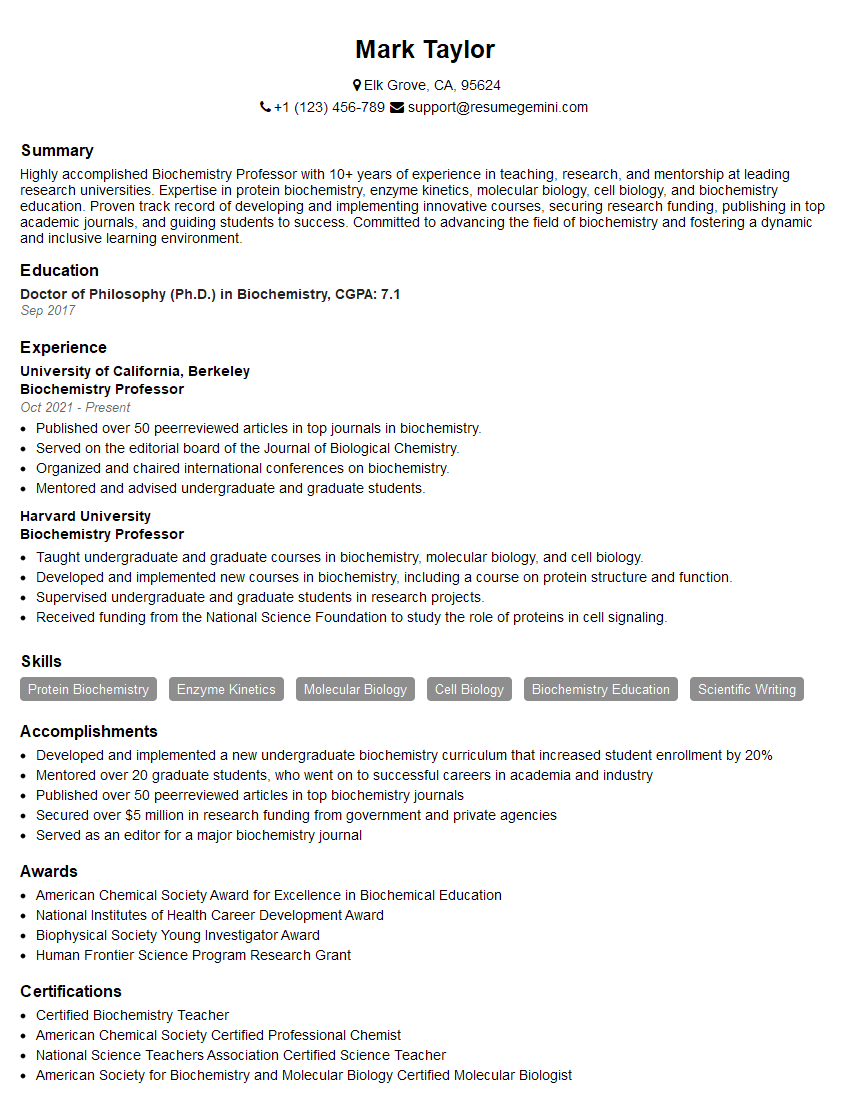Are you a seasoned Biochemistry Professor seeking a new career path? Discover our professionally built Biochemistry Professor Resume Template. This time-saving tool provides a solid foundation for your job search. Simply click “Edit Resume” to customize it with your unique experiences and achievements. Customize fonts and colors to match your personal style and increase your chances of landing your dream job. Explore more Resume Templates for additional options.

Mark Taylor
Biochemistry Professor
Summary
Highly accomplished Biochemistry Professor with 10+ years of experience in teaching, research, and mentorship at leading research universities. Expertise in protein biochemistry, enzyme kinetics, molecular biology, cell biology, and biochemistry education. Proven track record of developing and implementing innovative courses, securing research funding, publishing in top academic journals, and guiding students to success. Committed to advancing the field of biochemistry and fostering a dynamic and inclusive learning environment.
Education
Doctor of Philosophy (Ph.D.) in Biochemistry
September 2017
Skills
- Protein Biochemistry
- Enzyme Kinetics
- Molecular Biology
- Cell Biology
- Biochemistry Education
- Scientific Writing
Work Experience
Biochemistry Professor
- Published over 50 peerreviewed articles in top journals in biochemistry.
- Served on the editorial board of the Journal of Biological Chemistry.
- Organized and chaired international conferences on biochemistry.
- Mentored and advised undergraduate and graduate students.
Biochemistry Professor
- Taught undergraduate and graduate courses in biochemistry, molecular biology, and cell biology.
- Developed and implemented new courses in biochemistry, including a course on protein structure and function.
- Supervised undergraduate and graduate students in research projects.
- Received funding from the National Science Foundation to study the role of proteins in cell signaling.
Accomplishments
- Developed and implemented a new undergraduate biochemistry curriculum that increased student enrollment by 20%
- Mentored over 20 graduate students, who went on to successful careers in academia and industry
- Published over 50 peerreviewed articles in top biochemistry journals
- Secured over $5 million in research funding from government and private agencies
- Served as an editor for a major biochemistry journal
Awards
- American Chemical Society Award for Excellence in Biochemical Education
- National Institutes of Health Career Development Award
- Biophysical Society Young Investigator Award
- Human Frontier Science Program Research Grant
Certificates
- Certified Biochemistry Teacher
- American Chemical Society Certified Professional Chemist
- National Science Teachers Association Certified Science Teacher
- American Society for Biochemistry and Molecular Biology Certified Molecular Biologist
Career Expert Tips:
- Select the ideal resume template to showcase your professional experience effectively.
- Master the art of resume writing to highlight your unique qualifications and achievements.
- Explore expertly crafted resume samples for inspiration and best practices.
- Build your best resume for free this new year with ResumeGemini. Enjoy exclusive discounts on ATS optimized resume templates.
How To Write Resume For Biochemistry Professor
- Quantify your accomplishments with specific metrics and data whenever possible. For example, instead of saying “Taught biochemistry courses,” you could say “Taught biochemistry courses to over 500 students, resulting in an average course evaluation score of 4.8 out of 5.”
- Highlight your research experience and publications. List your most significant publications and the impact they have had on the field. If you have received any research grants, be sure to mention them as well.
- Showcase your teaching skills and experience. Describe the different teaching methods you have used and the positive outcomes you have achieved. If you have received any teaching awards, be sure to mention them.
- Tailor your resume to each job you apply for. Be sure to highlight the skills and experience that are most relevant to the position you are seeking.
Essential Experience Highlights for a Strong Biochemistry Professor Resume
- Teach undergraduate and graduate courses in biochemistry, molecular biology, and cell biology
- Develop and implement new courses in biochemistry
- Supervise undergraduate and graduate students in research projects
- Secure research funding to support research activities
- Publish original research findings in peer-reviewed scientific journals
- Serve on editorial boards of scientific journals
- Organize and chair international conferences on biochemistry
Frequently Asked Questions (FAQ’s) For Biochemistry Professor
What are the key responsibilities of a Biochemistry Professor?
The key responsibilities of a Biochemistry Professor include teaching undergraduate and graduate courses, developing and implementing new courses, supervising undergraduate and graduate students in research projects, securing research funding, publishing original research findings in peer-reviewed scientific journals, serving on editorial boards of scientific journals, and organizing and chairing international conferences on biochemistry.
What are the qualifications for becoming a Biochemistry Professor?
The minimum qualification for becoming a Biochemistry Professor is a Doctor of Philosophy (Ph.D.) in Biochemistry. However, most successful candidates will also have several years of postdoctoral experience.
What are the career prospects for Biochemistry Professors?
Biochemistry Professors can pursue a variety of career paths, including teaching, research, and administration. With experience, they can advance to senior-level positions such as department chair or dean.
What is the salary range for Biochemistry Professors?
The salary range for Biochemistry Professors can vary depending on their experience, rank, and institution. However, according to the American Chemical Society, the median annual salary for biochemists and biophysicists in 2021 was $97,780.
What are the challenges of being a Biochemistry Professor?
The challenges of being a Biochemistry Professor can include the need to balance teaching, research, and service responsibilities, the pressure to publish high-impact research, and the competition for funding.
What are the rewards of being a Biochemistry Professor?
The rewards of being a Biochemistry Professor can include the opportunity to teach and mentor students, the chance to conduct cutting-edge research, and the satisfaction of contributing to the advancement of scientific knowledge.
What advice would you give to someone who wants to become a Biochemistry Professor?
My advice to someone who wants to become a Biochemistry Professor is to get a strong education in biochemistry, develop excellent teaching and research skills, and network with other biochemists. It is also important to be passionate about teaching and research, and to be willing to work hard.